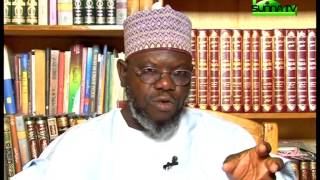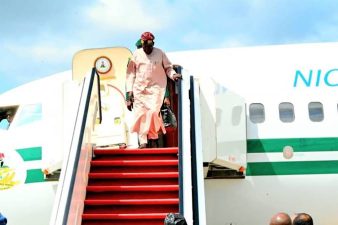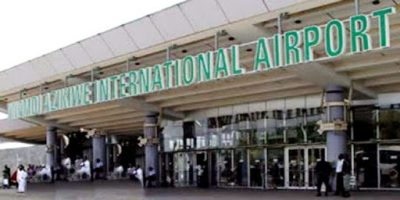*Says there must be no rush withdrawal from South East until…
*Gives analysis of how system decay causes agitations in the country
*Explains why failure of any of 3 arms of govt can cause crisis for nation’s leadership
*Tells why corruption in Police is more noticed but that all other sectors have corruptions going on in them
*“Lack of cooperation, synergy, networking among different security agencies big problem, as porous nature of security organizations put nation at security risk”
By Kemi Kasumu, General Editor
Professor Salisu Shehu, Dean of School of Continuing Education Bayero University Kano (BUK) and member of Bayero University Kano Governing Council, is Deputy Secretary-General of the umbrella body for the nation’s over 90 million Muslims, the Nigerian Supreme Council for Islamic Affairs (NSCIA). He spoke from Kano to two media organisations, The DEFENDER and Vanguard, for the NSCIA and himself, on national security and reiterated the Sultan of Sokoto, Alhaji Muhammad Sa’ad Abubakar III-led Supreme Council’s support for the Federal Government, South East governors and court on their actions against IPOB and other criminals threatening the nationhood of Nigeria. He also speaks on the best restructuring Nigeria needs: good governance and cooperation with the Muhammadu Buhari’s anti-corruption war by leadership of legislature, judiciary, local governments, ministries and parastatals and all others that make up the leadership of the country. He speaks more. Excerpts:
“So, leadership is not about one person. I must recognise the fact that one man at the helm of affairs can make a difference, but he can only make a difference to a certain extent like, for example, with this fight against corruption, all the major leakages in the resources of the country have been blocked. But, as you all know, there is still corruption in the ministries and in other government parastatals. The only thing is that, the major leakages through which Nigerian money is being stolen in monumental quantities have been blocked.”
At 57 years of independence and 47 years after the Civil War, why do you think Nigeria is still having all these situations of agitations in the country?
There are still agitations essentially because the country has not achieved the desired level of development and prosperity to support institutions in spite of abundant resources; both natural and human resources, that we would have exploited and marshaled appropriately for the development of the country.
So, with this problem of underdevelopment, people are generally poor and essentially there is a generally high level of poverty and lack of contentment. If people have been contented and basic or essential services have been rendered to the people, these agitations would not have been. Even if one says that the champions of the agitations are the elites, who one way or the other are promoting the agitations for their selfish interests, the bottom line is that, these selfish elites have found a fertile ground at the grassroots. They have found the teaming masses all sentiments they can whip because, those masses at the grassroots are angry because the system is not working.
The system is not working because there is a systemic decay in the country. The Nigerian system is not functioning well. So, these are the actual problems that we have in the agitations that you see.
You just said there is a systemic decay, which makes Nigerian system not functioning well. We have always blamed the problems of this country on leadership. With the Change Regime since 2015, can we still blame the problems of the country on leadership? And, on the systemic decay, is it still that the sitting government is not doing anything about it?
The problem of leadership will always be pointed as one of the problems of this country. When we talk of leadership, we are not talking of a single person but, we are talking of a collection of people at the helms of affairs. A government even in a small country of less than one million people cannot be run by one person, talk less of a government of a country of close to 200 million people.
So, when you talk of leadership especially in a democratic setting like this and especially in a presidential system like ours, a leadership is made up of three arms of government and, at the same time, it is also made up of three tiers of government. Talking of three arms of government, there is the executive, the legislature and the judiciary. And then you have the Federal Government, the state government and the local government talking about the three tiers of government all these constitute the leadership of the nation.
Even though you have one single person up there that is upright morally and he is a man of integrity, he can only do certain things within his own ability and capability. But then….
(Cuts in…) At what point then do leadership, going by your definition, run into crisis?
…if the other arms of government that are supposed to compliment the efforts of the executive are working at cross purposes, then, there is still leadership crisis.
So, by leadership, all people that have certain forms of authority, whether executive authority, legislative authority or judicial authority, must be ready for the Change and must be in tune with the drive for Change. So, if these are not there, then, there is still leadership crisis.
Leadership also boils down to people that have authority within the civil service like permanent secretaries and directors in ministries and parastatals. When these people are still corrupt and they don’t support the fight against corruption and they don’t support the drive for Change, there is still leadership crisis.
If secondary school principals and head masters of primary schools, chief medical directors of hospitals, vice chancellors of universities and provosts of colleges are also not necessarily upright, we still have leadership crisis.
So, leadership is not about one person. I must recognise the fact that one man at the helm of affairs can make a difference, but he can only make a difference to a certain extent like, for example, with this fight against corruption, all the major leakages in the resources of the country have been blocked. But, as you all know, there is still corruption in the ministries and in other government parastatals.
The only thing is that, the major leakages through which Nigerian money is being stolen in monumental quantities have been blocked. But there are still a lot of corruptions going on. It is these problems that are really there and, as long as they remain, people would continue to agitate.
Do you therefore agree with people who see the Independent People of Biafra (IPOB) agitations from the standpoint of bad leadership, when IPOB itself through its leader, Nnamdi Kanu, made it clear from the beginning that it was out to cause confusion in the land because certain person its leadership believes in lost election in 2015? And what would be your reaction to actions of the South East governors’ proscription, the Nigerian Armed Forces’ classification and court’s verdict against IPOB as terrorist organization?
Let me begin with the second question. The Nigerian Supreme Council for Islamic Affairs has already expressed its views about the actions of the Federal Government towards IPOB and the South East governments’ proscription that we support, unequivocally, the leveling of IPOB as a terrorist organization. This is so because, that is what they are. We also stated our support, for the South East governors, over the group proscription. They have both done the right thing and we support and commend their effort.
We also support the effort of Kano and other Northern states’ governors, who even visited and had meeting with their South Eastern counterparts over the issue. We say these are appreciable efforts from the side of the South East governors and other governors that proactively acted against the activities of IPOB.
That is our view and we have not changed it.
However, the fact that the emergence of IPOB is a symptom or consequence of systemic decay is not in doubt. Then, it is consequence of decay in the Nigerian security system.
Manifestations of systemic decay
This (systemic) decay is manifested in a number of ways. The first way is the fact that the security system is porous, and I mean porous because, it is influenced and pervaded by fraud and corruption at all levels. So, we that, any security threat can emerge and thrive because of the porous nature of the security system and the security organisation.
Each and every security agency has its nature and magnitude of corruption and fraud. Except that the one by the police is the only one that is so manifest, and it is so manifest because the police are the most exposed of the security organisations. That is why the corruption and fraud in the police is much more known to the common person and is much more known and is much more manifest. But all the other security agencies are influenced by corruption.
But how has corruption in the security organisation played a role in the problems at hand?
It is so because corruption in the security organisation is one aspect of systemic decay. Another aspect of systemic decay is the security organisation which gives room for the emergence of criminal organizations like IPOB, Boko Haram and these militants.
Another aspect of systemic decay is the lack of cooperation and synergy and lack of networking among the different security organizations.
These security organizations are supposed to operate in mutual interdependent and mutual cooperation through information, intelligence sharing, networking and all that. Now as a result of systemic decay, which is due to corruption and vested interests, the security organizations in Nigeria usually work at cross-purposes. That is one way. The other way, they hoard information that they are supposed to share with their fellow or sister agencies.
So, as a result of that, the information that may be required by the police to act may be hoarded by the SSS. And also the Military Intelligence has certain form of information that the people there will not share with other organizations. So, you find that there is lack of synergy and lack of networking and, therefore, they may be operating either at cross-purposes or at their different frequencies.
But don’t you think this could be as a result of lack of trust?
Yes, lack of trust is one of it and then there is problem of vested interest.
Vested interest? Kindly explain.
Vested interest because, may be some persons out there in one organisation is favourably predisposed, because of certain ulterior motive, to the agitations of one particular group, either because of nepotism or because he or she must have been given some money, and for that reason, he would not necessarily release the information that is required even when it comes to the level of investigations so that the real truth behind certain things cannot be unearthed.
And then the other aspect which is the third aspect of systemic decay in the security organisation is the shielding of criminals because money has changed hand; shielding of criminals because they belong to one’s own faith group or because they belong to his own ethnic group or they are his own in one way or the other.
These are manifestations and aspects of systemic decay in security organizations which can make all these kind of agitations and criminality that have posed threat to our national security to be happening.
Another manifestation of systemic decay in security organisation is the fact that because of its porous nature. There is proliferation of weapons and armoury in the hands of criminals and different people in the country and these things are being moved around in different ways, and the country will only be lucky if at a second coming some of these arsenals are intercepted. But who knows how many and what quantities have been able to pass through because of the porous nature of the security organizations?
Can’t you see the recent happenings in the arms that have been intercepted, arrested and seized by the Nigerian Customs Service for which some Customs officers have been indicted? And you find this kind of people in the police, in the military, in the SSS who are ready to mortgage the security of the country because they have received some money or because they sympathise with the criminals one way or the other. These are some of the things that are happening.
Although, Prof., I know you are a national person, but when the Buhari administration deployed Operation Lafia Dole troops in the North East against Boko Haram, nobody in the North raised any dust. But when Operation Python Dance II troops were deployed to clear the criminalities including IPOB, kidnappers, cultists and militants in the South East and South South, the media are awash with cries of injustice, which show that virtually every person in those parts of the country are not on the page with other regions in a bid to rid Nigeria of disturbances and threats to the nation. As a public figure of Northern extractions, what comes to your mind when you see these happening?
Honestly I think it is not completely true that some people are saying they don’t like deployment of the military in the South East or South South. In actual fact, there was a forum of Borno people who cried out against the state of emergency during Jonathan’s time and that was because the state of emergence was not yielding any fruit and it was not preventing any crime (because it was partial, declared merely at some local government areas). Yes, there was state of emergency but military soldiers were running away and dropping their weapons for Boko Haram to pick.
That was the point that the people in Borno State cried out against, that if the state of emergency will not stop this kind of things, then we don’t want it any more (otherwise, North East people had no problem with deployment of soldiers to fight Boko Haram for the peace of and security of their region). Therefore, people actually agitated at that time also but the only thing was that, the governors of the North East did not come out like the ones in the South East have done. There is no doubt about that.
Perhaps, one would say that the South Easterners are doing like they are doing because they have more experience about the effects of militarization of the area especially from the experience they had during the Civil War. This is the point. And therefore they must be jittery when the military are deployed and, which, especially, was why they came out and collectively proscribed the IPOB.
But then, in my own view, the Federal Government should not handle the matter with levity and that is why the government should not rush into evacuating the military from the region until they are very sure that everything is fully under control. In essence, I am saying, in my own view that the government should not rush into actually withdrawing the military from the (South East) region.
On a final note, His Eminence the Sultan once said Nigeria had been well structured but that each region should work hard to develop itself with the resources that they were getting. Do you really see any form of sincerity based on national interest in the current agitations for restructuring and, whatever your answer, is restructuring really the way to go? Advise the sitting government and people of Nigeria.
On a final note, I think the fundamental problem of this country is lack of good governance. This is my own view. I see this issue of restructuring as purely an elite interest, just like the agitations for state creation. When you create an additional state, you are just providing an opportunity for the elites of that particular enclave to go and hold on to power and keep on operating and squandering the resources of that particular area and leaving the people in abject poverty.
You are a media person. You know people as journalist and you go into various places. You don’t have barriers in going into Government Houses and all that. So, you know the usual cry in Nigeria from the authority is that there is no money in this country and that there is lack of resources. If you take out two things, you will know that the lots of common man will improve, whether restructuring or no restructuring.
These two things are, one, if people in government will reduce their extravagant spending, that is to say, keep the issue of looting aside and live within your legitimate resources. If you look at the extravagant nature of spending in government, if that can be reduced, you will know that things will improve.
If you go to any particular Government House in this country and see how extravagant the lives of state governors and their families and their hangers-on, how they live lavishly and extravagantly at the expense of hospitals that are in shambles, at the expense of children of the common man that are sitting on bare floor in primary schools, you know that if that extravagant spending can be cut down by 70 percent, even if 30 percent of that extravagant is being spent, these people can still be very comfortable in government. That 70 percent be used to improve the lot of the common man. You know that one because you are very close to people in government.
Then the other side is the issue of the looting; if it can be stopped, there will be a great deal of improvements in this country. But if there is no good governance, even if you restructure, the elites will now just withdraw to their regions, hold to power and then keep on mismanage the resources and then, the common man will now be the one to bear brunt.
This is my own view, honestly speaking. All those are just agitations by the elites because the common man Aba market that will go out every morning to earn a living and the common man in Kano market that will go out to earn a living will only want to have good road that if he produces his goods he can easily transport them to the market. The village farmer will only want road to transport his farm produce to the market without any hurdle.
The village woman that is pregnant should have good road through which she can easy be transported to the hospital when she is on labour. I am saying this because in this country village woman on labour is somewhere put on wheelbarrow when she is on labour, because there is no transport, to be brought to the road side to get a motorcycle. You see, these people don’t care about restructuring. What they care about is people who will really take care of their problem.




